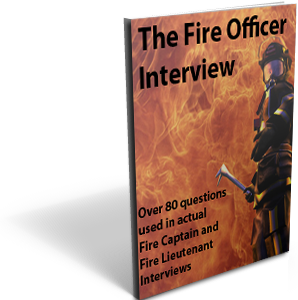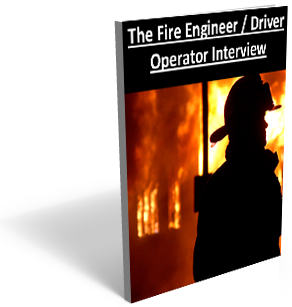After a long road of studying and then passing the written exam, it will finally be time for the Fire Officer Oral Board. Most candidates will begin looking for books or searching the internet for Fire Officer oral board questions or fire officer interview questions. There are some generic questions on forums and chat rooms, but you probably already know what those are. If you really want to succeed in your interview you need to be studying the difficult questions. You need to be ready for the questions that will catch the other candidates off guard. The best way to prepare for that is with our fire officer interview book. It consists of over 80 high quality interview questions that were used in real interviews. We have compiled these questions from oral board members, retired chiefs, and interviewees. It is the most comprehensive and complete fire officer interview preparation that exists.
Why we are superior:
- We provide the most commonly asked questions,
- then explain the key talking points
- Finally provide a detailed example answer
Here is an excerpt from our book:
23. Describe our department’s progressive discipline policy.
Key Points: You want to answer this question by walking through your department’s disciplinary process from the first step, up to termination. Talk about the officer’s role in each step. Also speak to how you will support decisions that are made at higher ranks regarding the discipline of a subordinate. If appropriate talk about performance improvement plans
Example Answer: Our department’s progressive discipline policy begins with a verbal warning. This takes place between the officer and his subordinate. The officer should explain the situation, lay out a plan for improvement, and hopefully resolve the issue at that step. The next step is a verbal reprimand, which must also be documented by the officer. The officer is also responsible for notifying the Battalion Chief of the incident. The next step is a written warning and a written performance improvement plan. This is done by the officer and Battalion Chief, and presented to the subordinate at a meeting. At this meeting they lay out an improvement plan, and discuss the future steps of discipline if no improvement is made. This is where all expectations must be crystal clear and proper time frames set. The next step is docking pay. This is done at our Battalion Chief level. As an officer, my job will be to continue documenting events, and provide support to the Battalion Chief. The final step is termination. The goal of discipline is not to punish, but rather to improve performance. Depending on the severity of the offense, discipline can begin at any level of process.
You can follow the link below to purchase our book through paypal and download instantly to any device.


